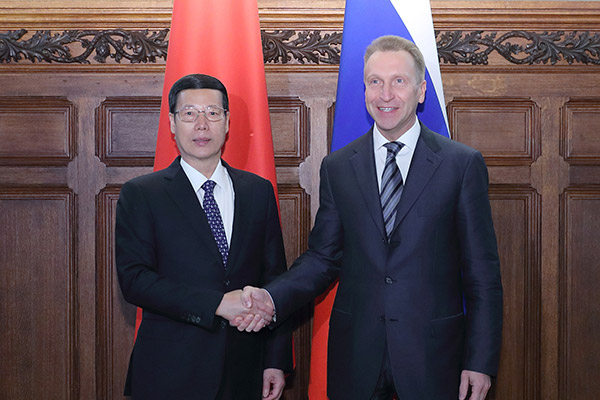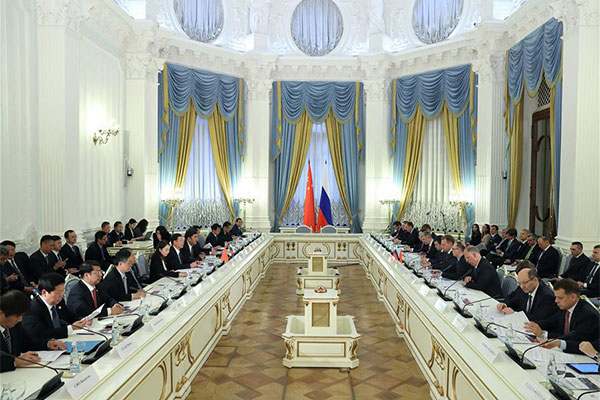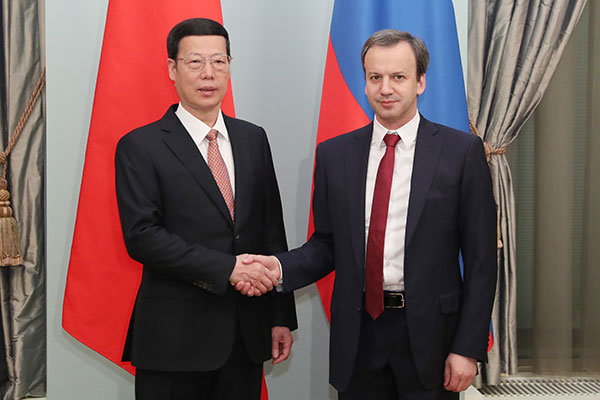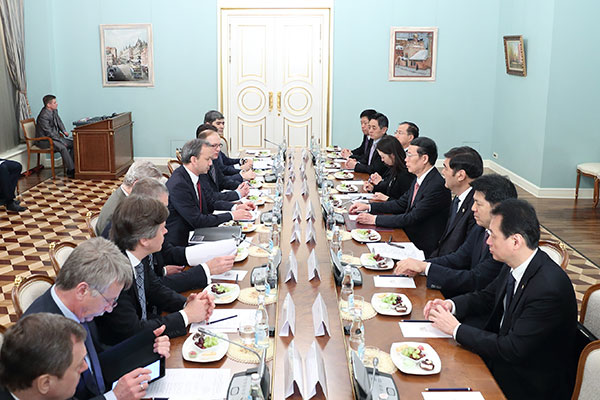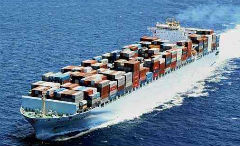China, Russia agree to expand investment, energy cooperation
2017-04-14
Xinhua
 Vice-Premier Zhang Gaoli (L) and Russian First Deputy Prime Minister Igor Shuvalov shake hands during the fourth meeting of the China-Russia Investment Cooperation Committee in Moscow, Russia, April 12, 2017.[Photo/Xinhua]
Vice-Premier Zhang Gaoli (L) and Russian First Deputy Prime Minister Igor Shuvalov shake hands during the fourth meeting of the China-Russia Investment Cooperation Committee in Moscow, Russia, April 12, 2017.[Photo/Xinhua]
The pledges came out of the fourth meeting of the China-Russia Investment Cooperation Committee, co-chaired by visiting Vice-Premier Zhang Gaoli and Russian First Deputy Prime Minister Igor Shuvalov, and the meeting between Zhang and Russian Deputy Prime Minister Arkady Dvorkovich in Moscow on April 12.
 Vice-Premier Zhang Gaoli and Russian First Deputy Prime Minister Igor Shuvalov co-chair the fourth meeting of the China-Russia Investment Cooperation Committee in Moscow, Russia, April 12, 2017.[Photo/Xinhua]
Vice-Premier Zhang Gaoli and Russian First Deputy Prime Minister Igor Shuvalov co-chair the fourth meeting of the China-Russia Investment Cooperation Committee in Moscow, Russia, April 12, 2017.[Photo/Xinhua]
The committee meeting is also meant to prepare for meeting between leaders of the two countries later this year, he said.
Zhang put forward three proposals to boost two-way investment cooperation. He called on both countries to further synergize China’s Belt and Road Initiative and Russia’s Eurasian Economic Union to give full play to the role of investment cooperation on integrating the two sides’ interests, complementing resources, synergizing industries, and conducting technology exchanges, among others.
The two countries need to actively explore cooperation on the third-party market, he said.
Besides, Zhang encouraged the two countries to continue to boost cooperation on major projects and properly implement the projects they’ve agreed upon.
China is ready to take an active part in the development of Russia’s Far East, Russia’s import substitution strategy and privatization process, and jointly set up more symbolic investment cooperation projects, the vice-premier said.
He also suggested both sides enhance regional cooperation and the cooperation between small- and medium-sized enterprises from the two countries.
China has always viewed Russia as its top priority partner for investment cooperation, said Zhang.
He said China hopes that the two sides will continue to give full play to the complementary advantages in such areas as resources, market, industry, technology, capital and human resources to benefit common development.
For his part, Shuvalov said Russia is satisfied with the progress made since the third investment cooperation committee meeting held in Beijing in June 2016, and is ready to implement the goals and tasks of investment cooperation set by the presidents of the two countries.
Stressing that Russia attaches great importance to the Belt and Road Initiative and the high-level forum on the initiative to be held in May in Beijing, Shuvalov said Russia would like to further link it with Russia’s Eurasian Economic Union.
Russia will closely follow the 73 cooperation projects set up during the fourth meeting and facilitate their implementation, he said, adding that he hopes both Russian and Chinese enterprises will lift their competitiveness on the global market.
During a separate meeting with Dvorkovich, the Russian chair of the China-Russia Energy Cooperation Committee, Zhang expressed the hope for implementing the presidents’ consensus on the energy sector so as to better prepare for the two leaders’ upcoming meeting through his current visit.
Hailing the sound basis, wide-range areas and great potential of the China-Russia energy cooperation, Zhang said the two countries need to continue to deepen their cooperation, jointly promote the projects including the east-route gas pipeline project and the Yamal liquefied natural gas (LNG) project, and conduct cooperation in areas including gas storage and natural-gas-burning power generation.
Echoing Zhang’s remarks, Dvorkovich said the Russia-China strategic partnership of comprehensive coordination is in line with the fundamental interests of both countries and both peoples.
China’s economic growth is conducive not only to the recovery and growth of global economy, but also to the pragmatic cooperation between Russia and China, he said.
Russia is willing to work with China to push cooperation in energy and other areas to yield more results, Dvorkovich said.
China’s import of crude oil from Russia set a record last year. According to statistics from Russia, in January 2017, Russia became the biggest crude oil exporter to China, exceeding Saudi Arabia.
According to Chinese Customs data, fuel supplies from Russia rose by a quarter last year compared with 2015, up to 1.05 million barrels per day.
 Vice-Premier Zhang Gaoli (L) and his Russian counterpart Arkady Dvorkovich shake hands during the meeting of the China-Russia Energy Cooperation Committee in Moscow, Russia, April 12, 2017.[Photo/Xinhua]
Vice-Premier Zhang Gaoli (L) and his Russian counterpart Arkady Dvorkovich shake hands during the meeting of the China-Russia Energy Cooperation Committee in Moscow, Russia, April 12, 2017.[Photo/Xinhua]
 Vice-Premier Zhang Gaoli(4th R) and his Russian counterpart Arkady Dvorkovich(6th L) talks during the meeting of the China-Russia Energy Cooperation Committee in Moscow, Russia, April 12, 2017. [Photo/Xinhua]
Vice-Premier Zhang Gaoli(4th R) and his Russian counterpart Arkady Dvorkovich(6th L) talks during the meeting of the China-Russia Energy Cooperation Committee in Moscow, Russia, April 12, 2017. [Photo/Xinhua]
